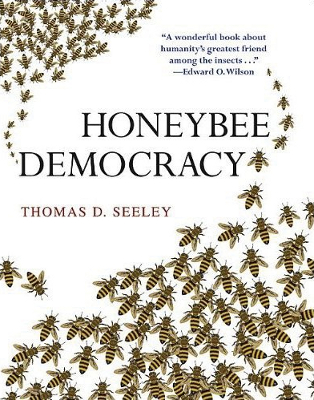
Honeybee Democracy
 I had originally planned to
write a lunchtime series about Thomas Seeley's Honeybee
Democracy, but I
ended up regaling you with most of the salient facts in my posts about our first
swarm and our
attempts to catch said swarm. Plus, you can read
the cliff-notes version of the parts most relevant to beekeepers in Swarm
Traps and Bait Hives.
I had originally planned to
write a lunchtime series about Thomas Seeley's Honeybee
Democracy, but I
ended up regaling you with most of the salient facts in my posts about our first
swarm and our
attempts to catch said swarm. Plus, you can read
the cliff-notes version of the parts most relevant to beekeepers in Swarm
Traps and Bait Hives.
Even though I'm sticking
to writing only one post about the book, I do heartily recommend that
anyone interested in honeybees check it out, especially the first half
before the text gets technical. The author studied under E.O.
Wilson, and his work was also informed by the methods of Karl von
Frisch, so Seeley's work is based on sound science, and is carefully
explained so it's understandable by laypeople.
As you probably
gathered, the book is all about swarm
behavior of honeybees, but the author interjects observations about how
the bees' version of democracy can inform our own. The last
chapter (which you can read as a stand-alone
ebook) considers
five lessons we can learn from the bees:
- Build decision-making groups out of individuals who share interests and mutual respect. (The bees do this the easy way --- the swarm only has one egg-layer, so if the queen perishes, so does all of their DNA.)
- Minimize the leader's influence on the group's thinking. (Although we think of the queen bee as a leader, she really doesn't make any decisions.)
- Seek diverse solutions to the problem. (When looking for a new home, a swarm usually sends out 300 to 500 scouts to search for possibilities, turning up around 13 to 34 potentials.)
- Aggregate the group's knowledge through debate. (Bees dance to show other bees the potential hive they've found, then those bees go out and look it over and decide whether to throw their support behind the site.)
- Use quorum responses for cohesion, accuracy, and speed.
(The swarm chooses to lift off and fly to a new site only after about
twenty to thirty bees are present at that site at any given time, which
means that most (but not necessarily all) scouts have come over to
their point of view.)
So, what do you think
--- would these bee lessons carry over to human groups?
Want more in-depth information? Browse through our books.
Or explore more posts by date or by subject.
About us: Anna Hess and Mark Hamilton spent over a decade living self-sufficiently in the mountains of Virginia before moving north to start over from scratch in the foothills of Ohio. They've experimented with permaculture, no-till gardening, trailersteading, home-based microbusinesses and much more, writing about their adventures in both blogs and books.
Want to be notified when new comments are posted on this page? Click on the RSS button after you add a comment to subscribe to the comment feed, or simply check the box beside "email replies to me" while writing your comment.

Hi - I just ordered the book and linked to your post from my blog at http://thisonegoodlife.blogspot.com/2013/05/forget-spelling-bees-today-were-doing.html because it seemed applicable. It's my first year and the learning curve is steep in beekeeping!